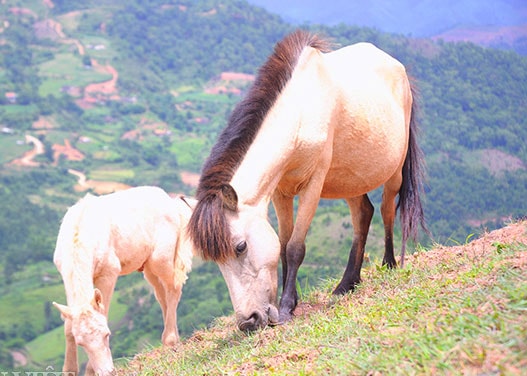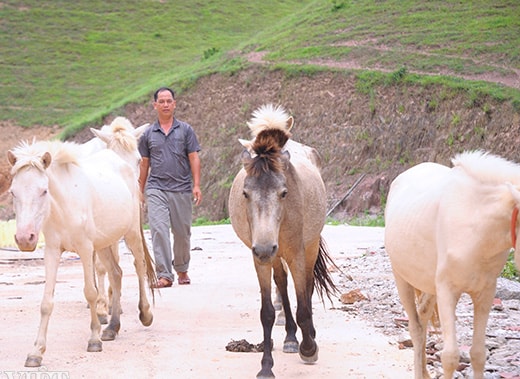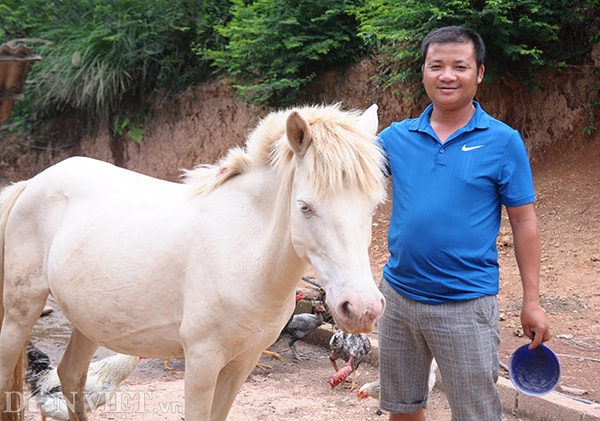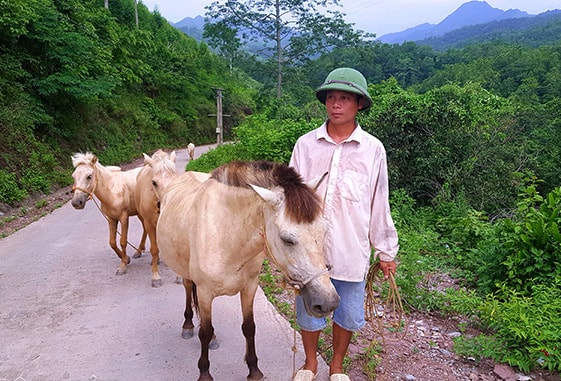About the place that raises the most white horses in Vietnam
The commune has the largest herd of white horses in Vietnam, with over 742. White horses are a rare breed, and their meat and bones can be used to make medicine, so they bring great economic benefits to the people here.
The white horse breeding profession began to develop in Huu Kien, Chi Lang district (Lang Son) from around 1990 when white horse products, especially white horse glue, were evaluated to have many health benefits and high medicinal value.
However, over time, the number of horses has gradually decreased. Until a few years ago, realizing the great value of white horses, supply not meeting demand, and no need to graze, many households in Huu Kien commune began to increase their herds, crossbreeding to create purebred white horses as beautiful as paintings.
 |
Raising horses does not require much investment in food, horses mainly eat grass and leaves in the forest. |
The wide grassy hills and vast grasslands are suitable places for people to graze white horses.
Thanks to the breeding of purebred white horses, it is not difficult to see the image of spacious houses with red roofs standing out in the middle of the mountains and forests along the winding road leading to the village. If the price of a normal horse ranges from 20 to 25 million VND, then a mature white horse can be sold on the market for about 50 to 70 million VND.
 |
Raising white horses brings high economic value, people here have a gradually better life. |
Also thanks to raising white horses, Mr. Nong Van Chung's family in Co Huong village, Huu Kien commune was able to build a nice house, buy a car, and buy an excavator in this poor and remote place. Pointing to the hill behind the house - where the family's horses are leisurely grazing, Mr. Chung confided: "To be honest, without the white horse, this poor village would have been like it is now for a long time. Many families have been able to build nice houses and buy cars, all thanks to the white horse."
Mr. Nong Quoc Mao, Co Huong village is a household that currently raises many white horses in Huu Kien, his herd is currently growing to 13 horses. Besides Mr. Mao, Mr. Nguyen Van Phuc (Me Thinh village) is also a household that is raising 15 horses. With the current economic value of the horse herd, each year these households can earn hundreds of millions of dong.
 |
Mr. Chung with his family's white horse. |
According to households raising white horses in Huu Kien commune, although the initial capital investment to raise white horses is relatively high, in return, white horses have few diseases and do not require much care due to the abundant food source because it can be taken from the forest or grown in home gardens such as corn, rice, grass... which are always available locally. On the other hand, raising white horses is much more economically efficient than raising other types of livestock and poultry. The capital recovery is quick and the consumption market is stable, so many households in the commune choose this model and consider it the main direction in the family's economic development.
Mr. Nong Quang Dam, Chairman of the People's Committee of Huu Kien Commune, said: Horse breeding is a long-standing custom of the people and is considered a strength in economic development in the area. Among them, white horses are sought after by many traders and have the highest economic value. In the past 15 years, due to expanding market demand, the number of horses in the herd of many households has continuously increased.
“Hu Kien is naturally blessed with a large area of over 8,000 hectares, including the vast Khau Sao Grassland, which is very favorable for horse grazing. Currently, there are over 1,700 horses in the area, of which there are over 742 white horses. The white horse breed is very easy to raise, gentle and has a value twice as high as that of normal horses,” said Mr. Dam.
 |
Raising horses does not require much investment in food, horses mainly eat grass and leaves in the forest. |
Each white horse that is ready to be sold for medicinal purposes (5-7 years old) costs an average of 40-50 million VND; a foal after weaning can also be worth over ten million VND. Investing in developing white horse breeding in the commune promises to dramatically change people's lives in the future.
Realizing the effectiveness of the model, many people in Huu Kien commune also expanded their herds, or saved up to buy horses for breeding. Now, Huu Kien is still surrounded by majestic mountains, clouds winding through the lush green forest, but looming are 2-storey red-roofed houses standing out in the middle of the mountains and forests. For children here, motorbikes, cars, and excavators are right before their eyes, no longer the toy models of a few years ago.

